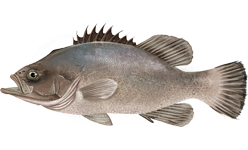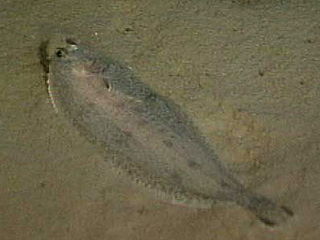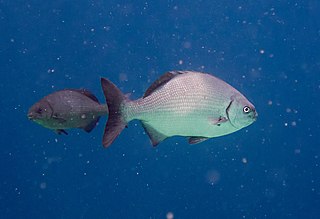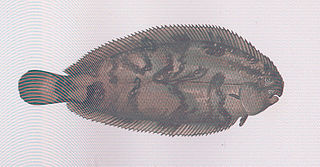
The black sea bass is a species of marine ray-finned fish, a sea bass from the subfamily Serraninae which is part of the family Serranidae, which also includes the groupers and anthias. It is found in the western Atlantic Ocean, where it is an important species for commercial and recreational fisheries.

The Atlantic wreckfish, also known as the stone bass or bass groper, is a marine, bathydemersal, and oceanodromous ray-finned fish in the family Polyprionidae. It has a worldwide, if disjunct, distribution in the Atlantic, Pacific and Indian Oceans.

The Scophthalmidae are a family of flatfish found in the North Atlantic Ocean, Baltic Sea, Mediterranean Sea, and Black Sea. Fish of this family are known commonly as turbots, though this name can refer specifically to Scophthalmus maximus, as well. Some common names found in species of this family are turbots, windowpanes, and brills.

The witch, known in English by a variety of other common names including the witch flounder, pole flounder, craig fluke, Torbay sole, and grey sole, is a species of flatfish from the family Pleuronectidae. It occurs on both sides of the North Atlantic Ocean on muddy sea beds in quite deep water. In northern Europe it has some importance in fisheries as a food fish.

The grey triggerfish, or gray triggerfish, is a species of ray-finned fish in the triggerfish family. The species is native to shallow parts of the western Atlantic from Nova Scotia to Argentina and also the eastern Atlantic, the Mediterranean Sea and off Angola on the west coast of Africa.

The European flounder is a flatfish of European coastal waters from the White Sea in the north to the Mediterranean and the Black Sea in the south. It has been introduced into the United States and Canada accidentally through transport in ballast water. It is caught and used for human consumption.

The solenette or yellow sole, Buglossidium luteum, is a species of flatfish in the family Soleidae, and the only member of its genus. It is characterized by its small size, low-slung semi-circular mouth, and regularly placed dark fin rays. A common and widespread species, it is native to sandy bottoms in the northeastern Atlantic Ocean and the Mediterranean Sea. It is of little commercial value.

Kyphosus sectatrix, the Bermuda chub, Pacific drummer, beaked chub, grey drummer, Pacific chub or white chub, is a species of marine ray-finned fish, a sea chub from the family Kyphosidae. This species is found in tropical and subtropical coastal waters worldwide. It has had a confused taxonomic history dating back to Linnaeus's naming of the species in 1758.
Scorpaena azorica, the Azores scorpionfish, is a species of marine ray-finned fish belonging to the family Scorpaenidae, the scorpionfishes. This fish occurs in the Northeastern Atlantic region in European waters. This fish is found in demersal and marine environments in subtropical waters, generally on hard bottoms. The maximum recorded length is 9.8 centimetres (3.9 in).

The grey gurnard is a species of ray-finned fish from the family Triglidae, the gurnards and sea robins. It is native to the eastern Atlantic Ocean, the Mediterranean Sea, and the Black Sea. It is caught as a food fish and is known for producing sounds. It is the only member of the monotypic genus Eutrigla.

The Mediterranean scaldfish, also known as the scaldfish, is a species of benthic left eyed flatfish belonging to the family Bothidae. It is found in the eastern Atlantic of Europe and Africa as well as the Mediterranean, and is of minor interest to fisheries.

Chaetodon hoefleri, the four-banded butterflyfish, is a species of marine ray-finned fish, a butterflyfish from the family Chaetodontidae. It is native to the tropical eastern Atlantic and has been recorded in the Mediterranean.

The brown meagre or corb is a species of marine ray-finned fish belonging to the family Sciaenidae, the drums and croakers. This species found in, the eastern Atlantic, Mediterranean Sea and Black Sea occurring in shallow waters and sandy bottoms. It is harvested for human consumption, especially in the Mediterranean.

Zeugopterus regius, Eckström's topknot or Bloch's topknot, is a small, left eyed flatfish in the turbot family Scophthalmidae found in European waters.

Umbrina canariensis, the Canary drum is a warm water, marine fish of the family Sciaenidae which is found in the western Mediterranean, eastern Atlantic Ocean and western Indian Ocean. Other English vernacular names are tesselfish, baardman, checker drum, common baardman, tasselfish and bellman.
Arnoglossus imperialis, the imperial scaldfish, is a species of flatfish from the family of left-eyed flounders, the Bothidae. It occurs in the eastern Atlantic from Scotland south to Namibia, extending into the western Mediterranean. This bottom dwelling species is sometimes caught as bycatch but is of little interest to fisheries.

The thickback sole, also known as the bastard sole and lucky sole, is a species of flatfish from the family of true soles, the Soleidae. It is found in the eastern Atlantic Ocean and the Mediterranean Sea, it is a quarry for fisheries in the Mediterranean.
Dagetichthys lusitanicus, commonly known as the Portuguese sole, is a species of flatfish native to the eastern Atlantic Ocean. Little is known of the abundance or behaviour of this fish, and the International Union for Conservation of Nature has rated its conservation status as being "data deficient".

Pterois paucispinula is a species of marine ray-finned fish belonging to the family Scorpaenidae, the scorpionfishes and lionfishes. It is found in the Western Pacific Ocean.

The large-scaled gurnard is a species of marine, demersal ray-finned fish from the family Triglidae, the gurnards and sea robins. It is found in the eastern Atlantic Ocean and the Mediterranean Sea.


















